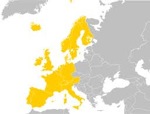
That’s the title of an article in FutureBook by Jürgen Snoeren. Here’s a snippet:
The 4th Editech Conference in Milan, held on June 9th, was mostly about the fragmented nature of the European digital market. That was not unexpected – the majority of the audience was Italian, and the Italian e-book market is among the smallest in Europe, small enough to say it is virtually non-existing.
One of the conclusions of the conference was that with the exception of the UK, there is no real e-book market in Europe yet. Market shares fluctuate between countries where the first step has been made – such as Spain (1,7%) and The Netherlands (0,8%) – and countries where there is no e-book market to speak of – such as Germany (<0,5%) and Italy (<0,1%).
Several speakers – myself included – pointed out that it has become increasingly clear that in analysing the global e-book market the European and Anglo-Saxon markets need to be carefully separated. Europe consists of many mainly small markets that lack the volume of readers and the level of investment needed to build the platforms, apps, sites and whatnot that are now being developed by US and UK publishers to connect with their readers.
The rest of the article is well worth reading. It contains a perspective that we don’t often see in the US.


































From the perspective of the small publisher, a key advantage of electronic publishing is that it offers an ideal mechanism for deploying books that don’t justify a big initial print run. Which should mean that a smaller market, such as the language-and-legally fragmented European markets, would be ideal for eBooks. After all, the hardware is the same, so the Basque speakers, for example, wouldn’t have to pay for that development. The books, presumably are already being written. All the introduction of eBooks would do would be to reduce the costs involved in printing paper.
I don’t know why Europe is lagging the US in eBook deployment but I don’t believe it’s the fragmentary nature of their markets. That would impact all book sales and shouldn’t harm eBooks specifically.
The article suggests that the fragmentation of the markets, coupled with the smaller commercial potential of each market, are to blame for the lag in the European market… I’d tend to agree. Without as much of a potential profit to make, the incentive to drive forward into ebooks largely isn’t as strong as it is in the U.S..
The other aspects of ebooks that are strong money-savers may convince EU countries to move ahead. But the prospect of producing ebook versions of old and orphan works, legalities and scan-and-OCR headaches, would be daunting to anyone.
Sounds like the issue is the old chicken-and-egg content quandary of new content platforms; no content, no reason to get a reader—no potential customers, no reason to do ebooks.
Even in the developed ebook markets of NorthAmerica, ebooks are still only about 10% of the market. But since its a big market (because of population *and* because of the relative popularity of reading-as-entertainment), even a single-digit slice of the market is big enough, in absolute terms, to be a compelling market.
If the overall market is small (because of population size, protectionistic barriers, lack of recreational reading habits, or all the above) the native-language content alone will not support ramp-up of the new market as there won’t be enough of a quick return on the investment to satisfy the money baggers.
Yet, instead of looking for ways to smooth adoption of the tech, they are concerned about “cultural imperialism” by english ebooks?
So, how are these small fragmented ebook markets going to develop?
Well, absent an injection of long-view entrepreneurial spirit into the local publishing houses (and how likely is that?) they can go to government looking for subsidies to defray the costs of converting their active catalogs and back lists to ebooks, probably paid by a tax on readers and cellphones.
Or, if they’re serious about blocking english ebooks, they can take a page out of the french playbook of decades past and adopt a separate, mandated, ebook standard to ensure only local content works. Not sure which way they’ll go but its not as they have many choices. Market size defines your options, after all.
Not to pick on anybody, but: if native dutch movies and shows were the only content available, would DVDs ever have amounted to much in the Netherlands? Or Denmark, or…
Conversely, China is in itself a big enough market they can adopt HD-DVD and make it work as a separate parallel standard to Bluray, which suits the needs of content producers and hardware vendors.
Hard choices lie ahead in those markets but I wouldn’t want to bet on their odds. There’s no law of nature that says they *have* to adopt ebooks. 🙂
@Felix: To be fair, Europe has always been concerned about, and defined by, “cultural imperialism.” So it’s not surprising that it has impacted ebook development, just like it impacts everything else there.
It’s true that they don’t have to adopt ebooks. But as paper and printing costs increase, ebooks spread worldwide, and other countries demonstrate the economic sensibility of going digital, I don’t see how they can’t adopt ebooks at some point in time. How soon is up to them (or their populace, who might force the issue on them if they wait too long).
@Mr Jordan, I agree. They do fret overmuch about “anglo-saxon” cultural domination, as if the english speakers didn’t have better things to do with their time. 😉
I just think that worrying about the “cultural imperialism” aspect of english ebooks availability is the surest way to hamstring the development of ebook tech in their regional markets. And cut their own throats.
After all, the quickest way to ramp up the market and bypass the chicken-and-egg problem is to piggyback their content onto the global ecosystems being set up by Kobo and Amazon. Trying to block access to the global english ecosystems is counterproductive, probably futile, and, as you say, a good way to force their customers to forcibly drag them kicking and screaming out of the 19st century. As we’ve seen, ebooks appeal to the heaviest pbook buyers and once those readers try ebooks they don’t go back.
They don’t *have* to do ebooks but if they don’t somebody else will. And a lot sooner than those miniscule penetration numbers suggest, too.
What they need to worry about is getting their own content out *before* their markets start to firm up. Waiting for the install base of readers to materialize first is a good way to cede the bulk of the market to those pesky anglosaxons from Canada and the US. 🙂
Ebook readers are only going to get cheaper and cheaper and sooner or later the hardware will lead the way even there. When it does, consumers will want content and if they don’t get it from the local publishers they’ll get it from the global english publishers. Or the darknet.
Not many options, really.
You and I do agree there, Felix: They should just pick an existing format (probably, preferably ePub) and start producing content. There’s already a platform for it, and even if it is foreign, it’s better than nothing.
They may be behind, but the longer they wait, the more painful the process will probably be.